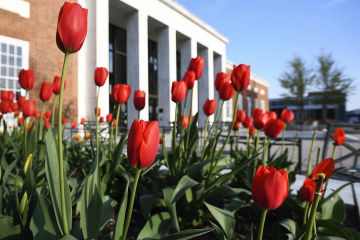A newly appointed committee composed of local nonprofit leaders, students, and Johns Hopkins professors and representatives will award $6 million in grants this spring for efforts to reduce violent crime in Baltimore neighborhoods.
The funds come via the JHU Innovation Fund for Community Safety, a four-year effort to support new and existing community-led programs to curb violence. After JHU President Ronald J. Daniels announced the creation of the fund last September, the university hosted multiple public listening sessions—involving several hundred residents, faculty, staff, and students—that were used to develop and refine a request for proposals. The RFP yielded more than 70 applications offering an array of approaches, focused on community mediation, environmental improvements, youth services, and support for individuals at high risk of becoming victims or perpetrators of violence.
The fund's 12-member selection advisory committee (full list below) has now begun the process of narrowing down finalists, which will be announced later this spring. Each grant-winning community nonprofit is poised to receive up to $250,000 annually for anti-violence efforts.
In addition to financial support, Johns Hopkins will provide technical assistance, data collection and analysis, and research through partnerships with experts across the university. The fund focuses on areas neighboring Johns Hopkins campuses in East Baltimore, Mount Vernon, and Charles Village.
The fund's selection advisory committee was assembled to reflect a broad range of perspectives and interests in Baltimore, including community leaders, a local high school student, and the president of JHU's Black Student Union.
"The Innovation Fund is attempting to prevent violence through dynamic solutions created from partnerships," says committee co-chair Vanya Jones, associate professor of health, behavior, and society at the Johns Hopkins Bloomberg School of Public Health. "I wanted to be part of the selection committee because I'm optimistic that these diverse partnerships will yield violence prevention strategies that address the specific needs of communities in Baltimore."
Committee co-chair Burgundi Allison, program associate for the Baltimore Civic Site and National Communities Strategies program at the Annie E. Casey Foundation, says she hopes the fund will foster projects "that reflect deep connections in the neighborhoods they endeavor to support—not a mastery of the data, but an understanding of culture, a reverence for community and its roots." She says the grants offer "an opportunity to assign value to people and places in our city that have been doing this work but have not had access to dollars to scale or improve their efforts."
The full selection advisory committee includes six community residents and six people affiliated with Johns Hopkins. The community residents are:
- Burgundi Allison, program associate, Baltimore Civic Site and National Communities Strategies, Annie E. Casey Foundation (Co-chair)
- amalia deloney, vice president, Robert W. Deutsch Foundation
- Charlene Harrod-Owuamana, CEO, Owuamana Enterprises
- DeJuan Patterson, CEO, Bridge Advisory Group
- James Timpson, director of Youth Work and Crisis Intervention, Roca Baltimore
- Lanae Williams, sophomore at Patapsco High School and Center for the Arts
The members affiliated with Johns Hopkins are:
- Ozioma Anyanwu, undergraduate and president of the Black Student Union
- Otis Brawley, Bloomberg Distinguished Professor, Sidney Kimmel Comprehensive Cancer Center, School of Medicine, and Department of Epidemiology, Bloomberg School of Public Health
- Christopher Heaney, associate professor, Environmental Health and Engineering, Bloomberg School of Public Health
- Vanya Jones, associate professor, Health Behavior, and Society, Bloomberg School of Public Health (Co-chair)
- Regina Gail Malloy, executive assistant to the president, Johns Hopkins Hospital
- Charles Scheeler, trustee, Johns Hopkins Board of Trustees
Posted in University News, Community








